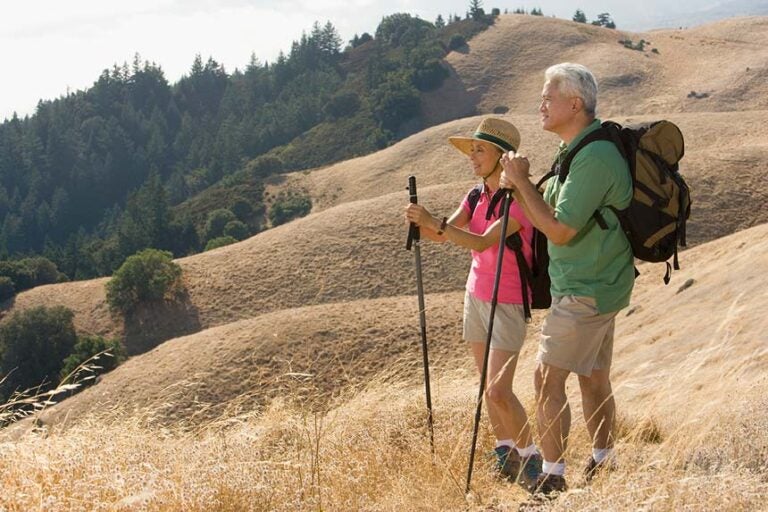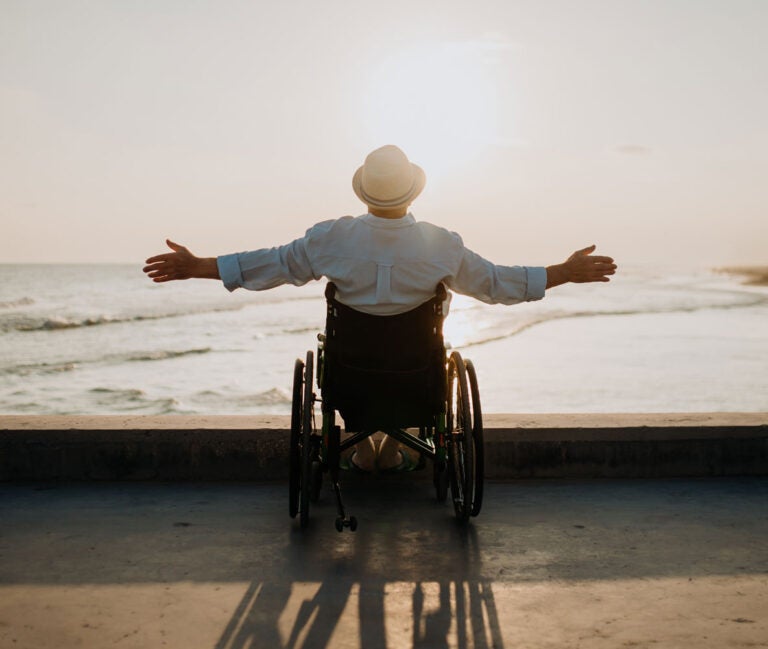Hiking can be a great way for people of all ages to stay active and enjoy nature. But whether you’re an experienced hiker or new to the trails, aging bodies require some extra attention when faced with the elements.
To help you hike safely and get the most enjoyment out of your time outside, we spoke with hiking and fitness experts to find out what mature adults need to keep in mind and prepare for on the trail. In addition to the National Park Service’s 10 hiking essentials, these experts shared six hiking tips for retirees looking to get the most out of their outdoor adventures.
1. Use Hiking Poles
Many older adults already have challenges with balance, says senior fitness expert Jeanette DePatie. She recommends that older people consider using trekking poles to help them on unstable ground. “The use of trekking poles can help you maintain your balance on uneven terrain and reduce the impact of hiking on your hips, knees, and ankles,” she says.
Julia Hubbel, a 69-year-old lifelong hiker who plans to climb Mount Kilimanjaro on her seventieth birthday, agrees that poles can be a huge help when on the trail. “The older you are, and the tougher your hike, hiking poles are both balance providers and lifesavers, like a second pair of feet on the trail,” she says.
2. Carry an Emergency Kit with Your Medications
Accidents happen on the trail with hikers of all ages and skill levels. But older people tend to be more susceptible to injury. That’s why experts say an emergency kit is an essential part of any outdoor activity.
“The most important item for a senior is to bring a small emergency kit with your medications and notes about your medical history,” says fitness expert Julien Heron, who has partnered with his retiree father, Claude, to form Outdoors Generations, a site dedicated to hiking and physical adventures.
Heron says that hikers should bring backup medication, even if it’s only something you take a night. “Having your meds on hand ensures that you will stay on track with your prescribed dosage even if you get back late or if you get stuck in the woods overnight,” he says.
These medications should be stored in a waterproof bag and include a note that describes your medications, allergies, and medical conditions, according to Heron, adding that it’s a good idea to include other health information as well.
“Write down your health insurance information and emergency contact information, just in case you get injured or ill and can’t communicate well,” he says.
3. Pay Attention to Your Gear and Clothing
There was likely a time when you didn’t give the clothes you wore on a hike very much thought. But as you age, paying attention to clothes and gear can help you overcome physical conditions that might otherwise hold you back.
It’s not uncommon for seniors to suffer from neuropathy or the loss of sensation in their feet due to aging, back injuries, diabetes, or other health conditions. This loss of feeling may impact the way you walk in rough terrain and, DePatie warns, you may develop serious blisters or other problems without noticing them. She suggests investing in higher-quality socks to keep your feet blister-free and dry.
Hubbel knows from experience that properly fitted shoes are a must, and she even suggests custom orthotic insoles. “You can’t begin to imagine how much a difference this can and does make to hips and knees.”
Erin Gifford, author of two hiking guidebooks, advises seniors to think carefully about the backpack they bring on the trail. “Don’t bring a string bag or a tote bag on a hike. As you age, you’re already more inclined to have back pain, so why add to potential back pain with a backpack that does not fit properly? Choose a daypack with waist and chest straps to adjust the load and distribute weight so it’s not centered on your back and shoulders.”
Herron suggests it is especially important to keep the pack weight as light as possible to provide more comfort on the trail.
4. Prepare for All Kinds of Weather
Bad weather is the bane of hikers everywhere, but older hikers are often more susceptible to cold and heat. So, it’s even more essential to be prepared for rapidly changing weather conditions.
“Make sure you’ve got a hat and some sunscreen [and] use it in all temperatures. Wear layers you can add or remove as needed.” says DePatie.
5. Pack Healthy Snacks
Exercise can lead to a precipitous drop in blood sugar, especially if you have hypoglycemia or diabetes. Even if you don’t have these conditions, you never know when hunger will strike, so it’s best to plan ahead.
“Make sure you have some snacks that will help keep your blood sugar steady, like nuts, as well as a few that can help quickly bring your sugar back up like orange juice or raisins,” says DePatie.
Hubbel agrees that healthy snacks are key when on an outdoor adventure. “Hiking is not an excuse to pound down bad calories. It is a very good reason to start fueling your body much more efficiently so that you can do the work, get the benefit, and feel like a million bucks,” she says.
6. Stay Connected
Have a fully charged cell phone with you while you hike. However, DePatie cautions, “Keep in mind you may not have coverage everywhere. So have your phone, but make sure that you have downloaded or printed copies of any important data such as trail maps.”
It’s also worth considering a satellite phone or a mini satellite communicator that pairs with your phone to keep you connected. These devices often have an SOS feature like a 24/7 search and rescue trigger to assist you in an emergency.
It’s also a good idea to let a friend or family member know where you’ll be and check in with them when you return.
A little preparation can go a long way to help you safely enjoy your time outdoors. Use our handy “Hiking Preparations Checklist” to help you get ready, so you can focus on the trail ahead without worrying you’ve left something essential behind!
Seniority is published by Finance of America Reverse LLC. The views expressed in this publication are those of the author alone and do not necessarily reflect the views and opinions of Finance of America Companies. This article is intended for general informational and educational purposes only and should not be construed as financial or tax advice. For more information about whether a reverse mortgage may be right for you, you should consult an independent financial advisor. For tax advice, please consult a tax professional.




